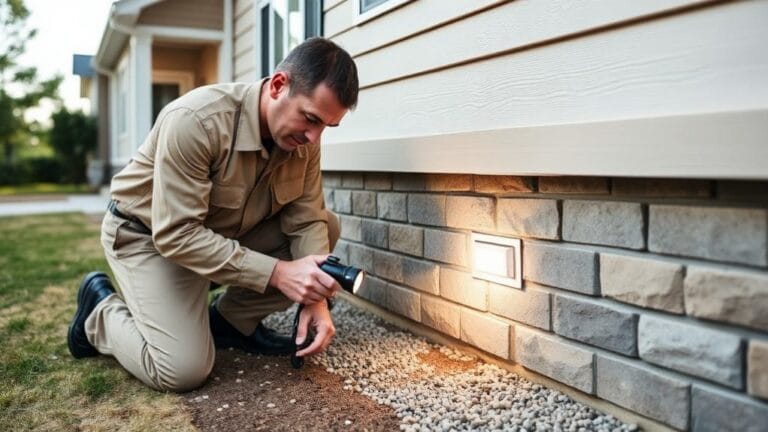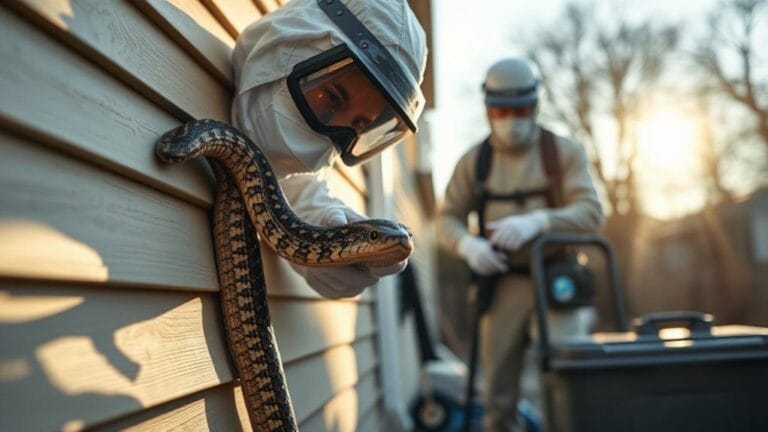Want to keep slithering visitors out of your garden? I've tested seven proven barriers that actually work. Start with snake-proof fencing (4+ feet tall and buried) combined with galvanized mesh featuring tiny 1-inch holes. Create natural barriers using plants like marigolds and lemongrass – snakes hate 'em. Add sharp gravel perimeters and motion-activated sprinklers for extra protection. Essential oil strips, solid garden edging, and strategic lighting round out your defense system. Don't forget regular maintenance – one tiny gap is all it takes for an unwanted guest. Stick with me to master these techniques and transform your garden into a snake-free zone.
Physical Fencing and Mesh Systems
Table of Contents
Two of the most effective ways to keep snakes out of your garden are physical fencing and mesh systems.
I'll tell you exactly how to set these up, so you won't have any surprise reptilian visitors crashing your garden party.
Your snake-proof fencing needs to be at least 4 feet tall – yes, really.
And don't think you can skip burying it a few inches underground. Those sneaky serpents love to pull a fast one by burrowing underneath.
The galvanized wire mesh options available today offer excellent durability against harsh weather conditions while effectively blocking even the smallest snakes.
For mesh systems, here's the golden rule: openings no larger than 1 inch.
Period. Want air and visibility? Great. Want snakes? Not so much.
Pro Tip: *Combine physical barriers with solid landscape maintenance.
And for heaven's sake, inspect your fencing regularly. One tiny gap is all it takes for an uninvited guest to slither through.*
Natural Plant Barrier Zones

Creating a natural defense against snakes starts with five powerful plant allies that pull double duty in your garden.
I'll show you how to transform your perimeter into a snake-repelling fortress using plants that actually look good doing their job.
Snake activity patterns vary with temperature and seasons, making year-round barriers essential.
Start by clustering these proven snake-deterrents:
- Marigolds and lemongrass (bonus: they're pretty and useful in cooking)
- Garlic and onions (who knew snakes were vampires too?)
- Mother-in-Law's tongue and wormwood (yes, they're as tough as they sound)
Pro Tip: Don't scatter these barrier zones randomly. Create dense clusters around entry points where snakes typically sneak in.
You'll want to maintain these companion plants religiously – half-dead plants won't cut it when it comes to releasing those essential oils that repel snakes.
Trust me, a thriving barrier beats a wimpy one every time.
Hardscape and Gravel Perimeters
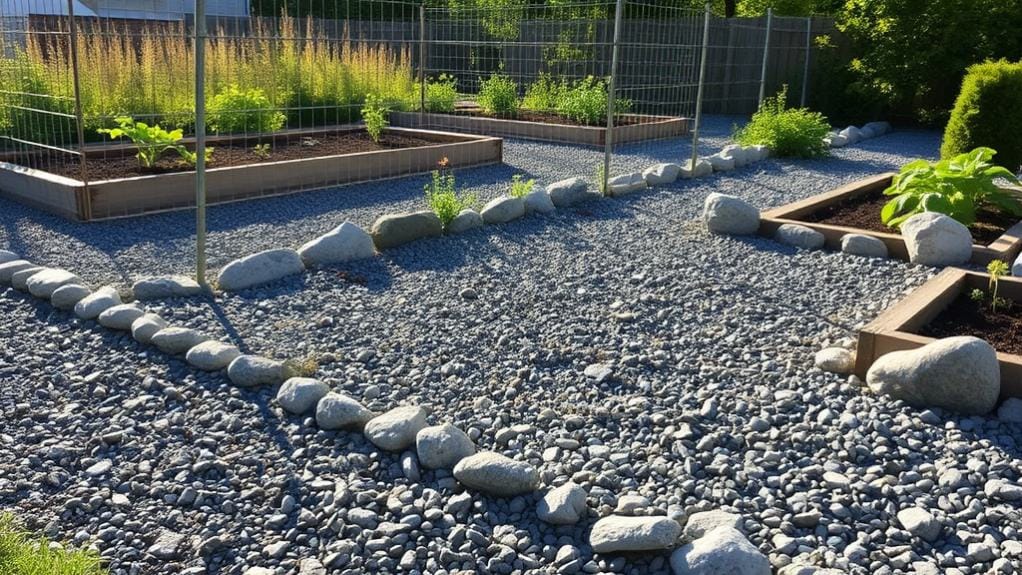
When it comes to keeping snakes out of your garden, strategic hardscaping serves as your first line of defense. I've found that creating barriers with stone walls and brick pathways isn't just pretty – it's your ticket to a snake-free zone. Those slithery fellows hate it when they can't find hiding spots!
Sealing concrete cracks with caulk adds an extra layer of protection against snake intrusion.
Here's what you need to know about effective hardscape and gravel perimeters:
- Install gravel at least 3-4 inches deep – snakes aren't fans of the rough stuff
- Use sharp-edged gravel to make movement extra uncomfortable
- Create solid barriers with stone walls and brick pathways
- Remove debris regularly – don't give them cover options
- Combine hardscape with other snake deterrents for maximum impact
*Pro tip: Your barriers are only as effective as you maintain them. Let things get messy, and you might as well roll out the welcome mat for unwanted guests!*
Motion-Activated Sprinkler Defense
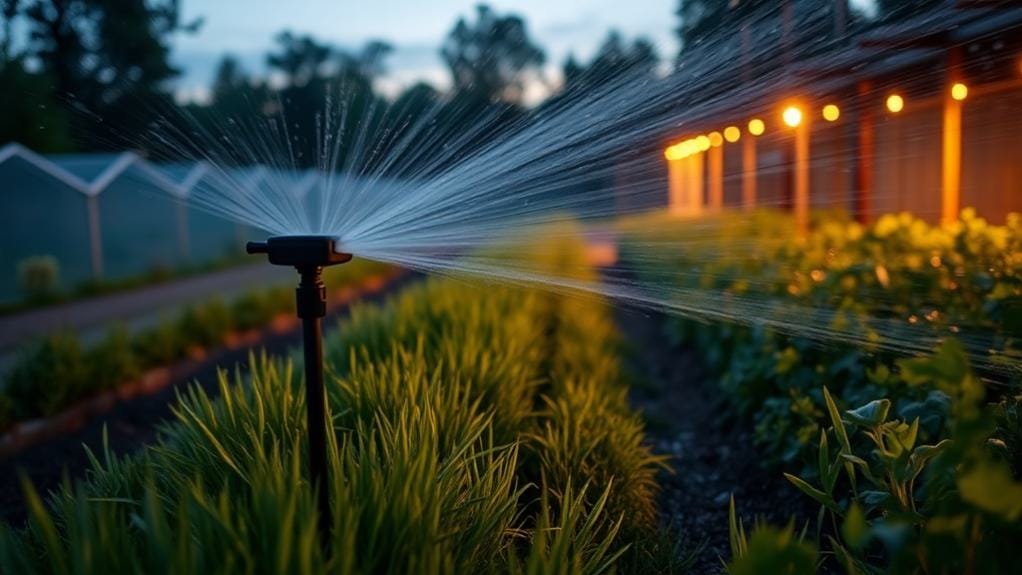
Motion-activated sprinklers pack a powerful punch in your snake defense arsenal. I've seen these smart devices protect gardens using infrared sensors that detect movement and blast unwanted visitors with a water burst.
Much like natural snake repellents that require regular reapplication, these systems need consistent monitoring for best results. Trust me – nothing sends a snake slithering away faster than an unexpected shower!
Here's what makes these systems so effective:
- They cover massive areas (up to 3,000 square feet!)
- You can customize detection range for your specific needs
- Many models pull double duty by watering your plants while deterring snakes
Pro Tip: Don't just set it and forget it. Regular maintenance is essential for continuous protection. Test your system weekly and adjust sensitivity settings as needed.
Want maximum snake deterrence? Combine these sprinklers with other barriers.
And yes, your neighbors might think you're crazy when they see you testing it – but hey, better safe than sorry!
Essential Oil Deterrent Strips

Natural essential oil strips regularly prove themselves as effective snake deterrents in garden protection.
I've found these environmentally friendly barriers are incredibly effective at keeping snakes away using natural ingredients like clove oil and cinnamon oil.
Similar to mint and peppermint plants, these oils create a strong scent barrier that snakes instinctively avoid.
You'll love how they're safe for pets while creating an invisible barrier around the perimeter of your property.
- Place strips every 3-4 feet around your garden's border
- Replace strips monthly (sooner if it rains a lot – because duh!)
- Use multiple oils for maximum effectiveness
- Monitor strip conditions weekly
- Combine with other deterrents for best results
Pro tip: Double up on strips in known snake entry points – those sneaky reptiles can be persistent!
Trust me, essential oil deterrent strips are your new best friend for repelling snakes naturally.
Just don't forget to maintain them regularly – a stale strip won't keep anything away except maybe your nosy neighbors.
Snake-Proof Garden Edging Materials
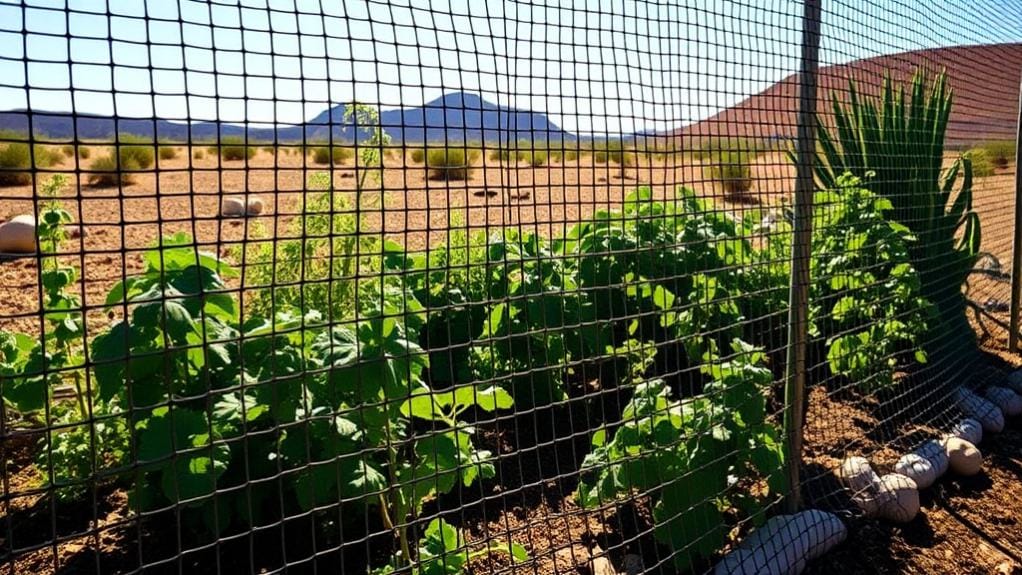
From a protective standpoint, installing the right garden edging materials creates your first line of defense against unwanted snake visitors.
I'm talking about serious snake-proof barriers that mean business – not those flimsy plastic edges that couldn't stop a determined earthworm. Just like snake-proof fencing that professionals recommend, these barriers require careful installation and maintenance for maximum effectiveness.
Here's what you absolutely need:
- Install edging at least 4 feet tall (yes, really – snakes are surprisingly good climbers)
- Choose solid metal, heavy-duty plastic, or smooth-surfaced wood
- Bury that barrier a few inches deep – no cheating!
Pro Tip: Want extra protection? Add gravel or mulch around your edging. Snakes hate that stuff.
Listen up – regular inspections are non-negotiable. One tiny gap and boom – you've got a snake superhighway into your garden.
Trust me, you don't want that surprise while picking tomatoes.
Strategic Lighting and Sound Barriers
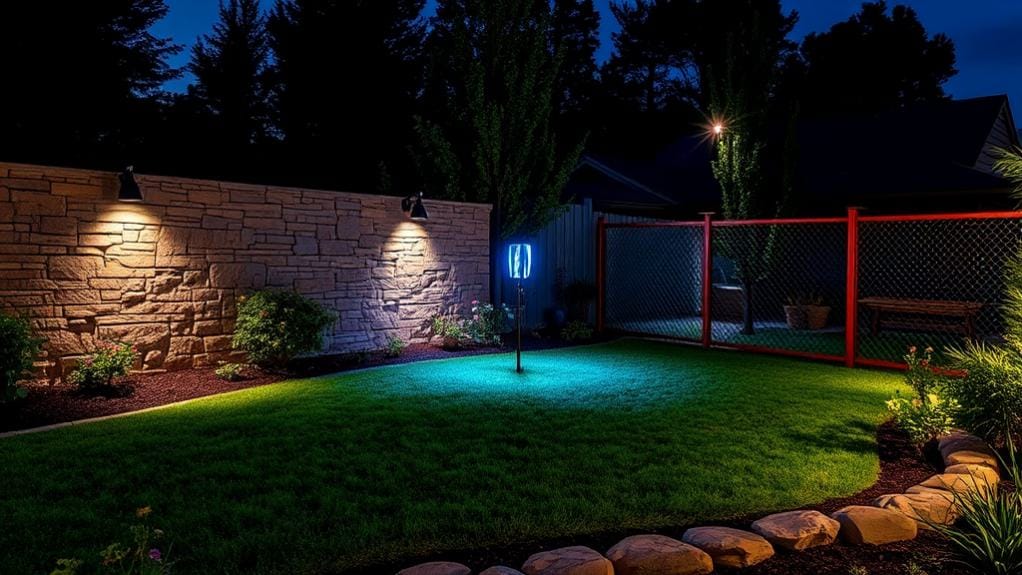
While physical barriers form a solid foundation for snake prevention, smart lighting and sound strategies add another powerful layer of defense.
I've found that combining strategic lighting with sound barriers creates an unwelcoming environment that'll make snakes think twice before slithering into your garden paradise.
Here's what you need to know about these sensory stimuli deterrents:
- Motion-activated LED lights disrupt snake activity (because who likes a surprise spotlight?)
- Ultrasonic devices emit high-frequency waves that repel snakes
- Regular maintenance keeps your deterrence system working (dead batteries won't scare anything)
- Position devices near common snake entry points for maximum effect
- Combine with physical barriers for a thorough approach that'll make snakes say "nope!"
*Pro Tip: Test your devices monthly – effective deterrence only works when everything's actually powered on and functioning!*
Frequently Asked Questions
What Is Proven to Keep Snakes Away?
I'll tell you what's proven to keep snakes away: physical barriers, natural repellents like garlic spray, essential oils, snake-repellent plants, regular yard maintenance, and ultrasonic devices. They're all effective when used properly.
Is There a Way to Snake Proof Your Yard?
Powerful protection prevents pesky predators! I'll tell you that installing tall snake-proof fencing, removing debris, keeping grass short, sealing gaps, and planting natural repellents will effectively snake-proof your yard for safety.
Does Snake Repellent Actually Work?
I've found snake repellents have mixed results. While chemical ones can work temporarily, they're toxic and need frequent reapplying. I'd recommend physical barriers like snake-proof fencing for more reliable, long-term protection.
What Ground Cover Do Snakes Hate?
I've found that snakes strongly dislike ground covers with intense scents like garlic, onions, marigolds, and lemongrass. I'd also recommend wormwood and Mother-in-Law's tongue, as they'll naturally keep snakes away.
Last Word
Look, I've given you seven solid ways to keep those slithery party-crashers out of your garden. You can build Fort Knox with fancy fencing or go full disco with motion lights – whatever works! But let's be real: if you're not using at least three of these barriers, you're basically running a snake bed & breakfast. I don't know about you, but I prefer my cucumber patch without scales and forked tongues. Your move, gardener.



